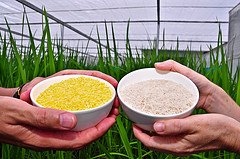 |
| Golden Rice Plants IRRI |
“Precaution does not necessarily mean a ban.
It simply urges that time and space be found to get things right.”
Professor Andy Stirling, writing in the Guardian
Overview
The UK Parliament Science and Technology Select Committee is carrying out an inquiry into genetically modified (GM) foods and the way in which these are regulated in Europe under the precautionary principle.
STEPS Centre Co-Director Professor Andy Stirling gives oral evidence on 19 November (09.15 GMT) following our written submission to the inquiry, which was signed by 19 academic experts in this area.
The Centre has long-argued that a simplistic ‘pro’ or ‘anti’ stance on GM crops leaves little room for a more informed and balanced debate not only about this technology, but a range of alternative innovations too. There are many advanced non-GM techniques and a multitude of non-technological solutions that tend to be eclipsed by the restrictive focus on GM.
The precautionary principle opens the door to many strategies for coping with these issues. It recognises that even the most confident science rarely compels a single solution. And many uncertainties and ambiguities further underscore the importance of more accountable discussion of contending values and priorities. Too often these open-ended complexities tend to get closed down, as if they were merely about 'risk'.
In these terms, precaution is not about blocking technologies, but steering innovation to more effectively favour of human health, environmental integrity and social well-being, and providing a counterweight to otherwise dominant incumbent interests.
Acknowledging the scope for systematic deliberation over values, priorities and alternatives in the context of uncertainty, precaution broadens out risk regulation to allow greater consideration for a wider plurality of issues, options, perspectives and scenarios. It allows the reshaping of established trajectories and a greater focus on qualities of diversity, flexibility and responsiveness.
In short, pecaution expresses the fundamental principle that — in innovation just as in science itself — reasoned scepticism fosters greater quality.
Innovation: managing risk, not avoiding it
Walport report: On 19 November the UK Government Chief Scientific Adviser Sir Mark Walport launches his inaugural annual report, focussing on innovation and risk. Prof. Stirling has contributed a chapter to the report, related to the evidence submitted to this inquiry.
Science and Technology Committee inquiry
- The STEPS Centre’s written evidence to the inquiry signed by 19 academics
- Prof. Andy Stirling, Co-Director of the STEPS Centre, gives oral evidence on 19 November 2014, during the fourth inquiry session focussing on social and political considerations in the regulation of emerging technologies with particular attention to how the precautionary principle might guide regulation under conditions of uncertainty.
Watch this session on Parliament TV - Watch the all the sessions
Session 1 (15 Oct) | Session 2 (29 Oct)| Session 3 (5 Nov) | Session 4 (19 Nov) - Guest blog by Rupert Read: The precautionary principle must be retained, unless we are willing to be reckless with our common future (18 Nov)
- Follow the story of GM and the precautionary principle on Storify:
The precautionary principle: selected reading from Andy Stirling
 A selection of publications from Andy Stirling on the precautionary principle. For a fuller listing, see his publications page.
A selection of publications from Andy Stirling on the precautionary principle. For a fuller listing, see his publications page.- Walport report – Prof. Stirling’s chapter Making choices in the face of uncertainty: towards innovation democracy? will be available for download on the afternoon of 19 Nov when the Government Chief Scientic Adviser Sir Mark Walport’s report Innovation: Managing risk not avoiding it is launched
- Why the precautionary principle matters by Andy Stirling for The Guardian, 8 July 2013
- Late lessons from early warnings; the precautionary principle 1896-2000. Environmental issue report No 22, Eds: D. Gee, M. MacGarvin, A.Stirling, J.Keys, B. Wynne, A. Gueerdes Vaz, European Environment Agency, Copenhagen, 2001
- Stirling, Andrew (2006) Precaution, foresight and sustainability: reflection and reflexivity in the governance of technology. In: Voss, J, Kemp, R and Bauknecht, D (eds.) Reflexive governance for sustainable development. Edward Elgar, Cheltenham, UK, pp. 225-272. ISBN 9781845425821
- Stirling, Andrew (2003) Risk, uncertainty and precaution: some instrumental implications from the social sciences. In: Berkhout, F, Leach, Melissa and Scoones, Ian (eds.) Negotiating environmental change: new perspectives from social science. Edward Elgar, Cheltenham, UK, pp. 33-76. ISBN 184376153X
- Stirling, Andrew (2000) On `precautionary’ and `science based’ approaches to risk assessment and environmental appraisal. In: Klinke, A, Renn, O, Rip, A, Salo, A and Stirling, A (eds.) On science and precaution in the management of technological risk.
- Stirling, Prof Andrew, ed. (1999) On Science and Precaution in the Management of Technological Risk: Volume II -case studies. European Commission Institute for Prospective Technological Studies.
- Stirling, Andrew (1999) On science and precaution in the management of technological risk: volume I – a synthesis report of case studies. Institute for Prospctive Technology Studies.
- Stirling, Andrew and Mayer, Sue (2005) Confronting Risk with Precaution: a Multi-Criteria Mapping of Genetically Modified Crops. In: Getzner, Michael, Spash, Clive L and Stagl, Sigrid (eds.) Alternatives for Environmental Valuation. Routledge. ISBN 9780415310123
Key resources: selected reading from other authors
- The Precautionary Principle (with Application to the Genetic Modification of Organisms) by Nassim Nicholas Taleb, School of Engineering, New York University; Rupert Read, School of Philosophy, University of East Anglia; Raphael Douady, Institute of Mathematics and Theoretical Physics, C.N.R.S., Paris; Joseph Norman and Yaneer Bar-Yam, New England Complex Systems Institute. Extreme Risk Initiative —NYU School of Engineering Working Paper Series
- Ely, A. (2008) ‘Risk: Safety is just the start if we want good regulation’, Food Ethics 3, 3 ‘GM Foods – the Wrong Debate?’ Autumn 2008, Food Ethics Council

- We turfed out GM crops for a reason, but they won’t wither and die by Charles Clover, The Sunday Times (26 October 2014, subscription needed)
The STEPS Centre’s work on GM and biotechnology around the world
A selection of our work on how science, policy and politics interact around biotechnology.
The Politics of GM Food: Risk, science and public trust
 Why do controversies such as BSE and GM food throw British governments and business off balance? This briefing on how to get out of the GM impasse and how to avoid these problems in future, remains as vital and current today as when it was written by Alister Scott, Frans Berkhout and Ian Scoones (Director of the STEPS Centre) in 1999.
Why do controversies such as BSE and GM food throw British governments and business off balance? This briefing on how to get out of the GM impasse and how to avoid these problems in future, remains as vital and current today as when it was written by Alister Scott, Frans Berkhout and Ian Scoones (Director of the STEPS Centre) in 1999.The Politics of GM Food: Risk, science and public trust (PDF) ESRC Global Environmental Change Programme (1999). The Politics of GM Food: Risk, Science &Public Trust, Special Briefing No 5.
 Biotechnology Research Archive
Biotechnology Research Archive10+ years of research into GM crops, development and the food crisis, under four themes:
- Poverty reduction & food security: impacts of GM crops
- Regulating GM crops
- The role of the private sector and corporate control
- Public participation and the politics of policy
- Rethinking Regulation Seeds and drugs in China and Argentina
- Beyond Biosafety How to ‘open up’ debates about and beyond biosafety in Kenya and the Philippines.
Books, blogs, media, articles
- Rice Biofortification: Lessons for Global Science and Development by Sally Brooks (Earthscan 2010)
- Regulating Technology: International Harmonization and Local Realities by Patrick van Zwanenberg, Adrian Ely and Adrian Smith (Earthscan 2011)
- If GM is the answer, it is only the answer partly, sometimes, maybe (Ian Scoones, Think Africa Press, June 2014)
- Why the fuss about GM food? Other innovations are available (Andy Stirling, The Guardian – Political Science blog, 28 June 2013)
- GM crops ten years on: hope, hype and reality (Ian Scoones, Institute of Development Studies, May 2009)
- ‘Golden Rice’ and the GM crop debate (Sally Brooks, 24 June 2013)
- GM Crops: what people in the global South really think (Dominic Glover, 17 June 2014)
- Undying Promise: Agricultural Biotechnology’s Pro-poor Narrative, Ten Years On by Dominic Glover (STEPS Centre 2009)
- Is international agricultural research a global public good? The case of rice biofortification (2011) by Sally Brooks, Journal of Peasant Studies

Media enquiries
Julia Day, STEPS Centre Head of Communications
Email: j.day@ids.ac.uk | +44 7974 209148
